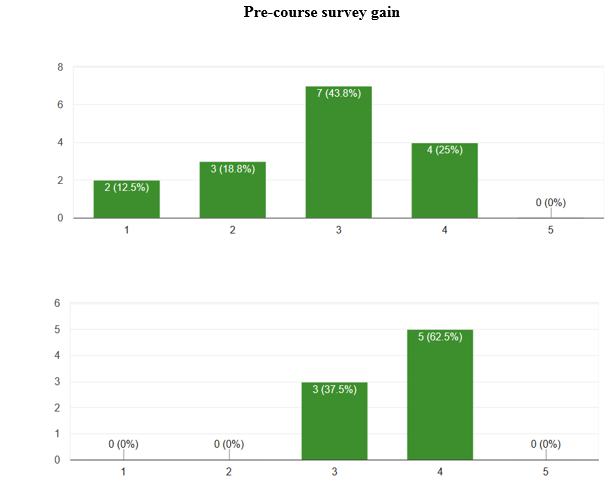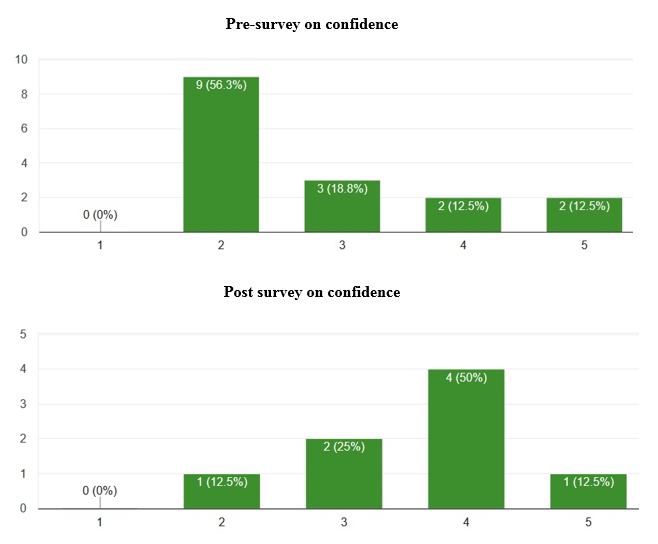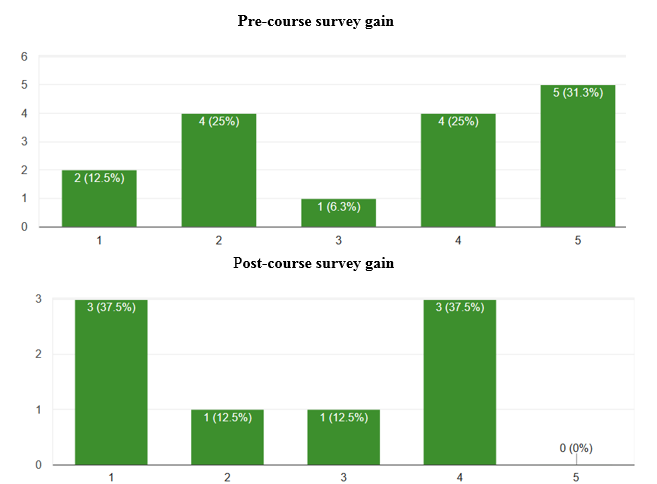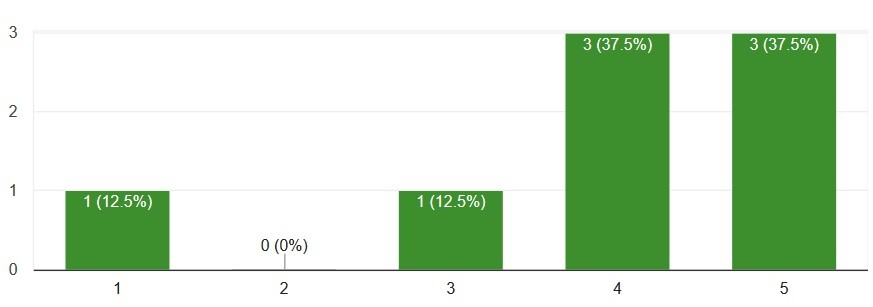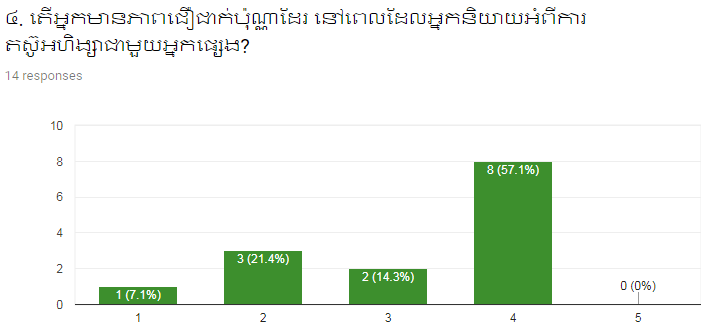An Introduction to Civil Resistance and Nonviolent Movements: A Course Taught by a 2017 ICNC Curriculum Fellow
Bunly Soeung, a 2017 ICNC Curriculum Fellow, developed and moderated an online course for Cambodian college students in the Fall of 2017. His five week course was offered on the ICNC Online Platform. His course ran from September 6th to October 18th. Out of the sixteen students who enrolled in the course, eight students successfully finished the course.
was offered on the ICNC Online Platform. His course ran from September 6th to October 18th. Out of the sixteen students who enrolled in the course, eight students successfully finished the course.
The information featured below was submitted as part of his fellowship requirements that, among other things, included creating a detailed course proposal, developing online content, designing evaluation tools, selecting participants and extensive moderation throughout the course.
Learn more by clicking on the topic links:
About the Curriculum Fellow
Course Abstract
Learning Gains Survey Results
Final Course Evaluation Results
Selected Testimonials
Three Month Follow-up Survey
About the Curriculum Fellow
 Bunly Soeung is a full-time lecturer of public administration at Svay Rieng University, Cambodia. He has also worked as a freelance research coordinator for peace research projects. He received his master’s degree in Public Administration with a focus on Public Policy in 2010 from Universitas Padjadjaran, Indonesia. Between 2013 and 2015, he was a peace research team member for the Alliance for Conflict Transformation. In 2015, he finished a master program in Higher Education at the University of Hong Kong, focusing on students’ perspective on freedom of critical inquiry in Cambodia. In 2016, he translated a 160-page book entitled “May 18 Gwangju Democratic Uprising” about the May 18th Foundation in South Korea. His primary research interests are cultural peace-building, non-violent civil resistance in Cambodia, and academic freedom. Recently, his co-authored journal article on “The Revitalisation of Buddhist Peace Activism in Post-War Cambodia” was published in the Conflict, Security & Development Journal, Volume 17. It examines how Cambodian Buddhist monks develop and maintain their normative legitimacy and connection with civilian followers by focusing on their approaches to four types of resources: religious authority, cultural knowledge, social networks, and new communication technology.
Bunly Soeung is a full-time lecturer of public administration at Svay Rieng University, Cambodia. He has also worked as a freelance research coordinator for peace research projects. He received his master’s degree in Public Administration with a focus on Public Policy in 2010 from Universitas Padjadjaran, Indonesia. Between 2013 and 2015, he was a peace research team member for the Alliance for Conflict Transformation. In 2015, he finished a master program in Higher Education at the University of Hong Kong, focusing on students’ perspective on freedom of critical inquiry in Cambodia. In 2016, he translated a 160-page book entitled “May 18 Gwangju Democratic Uprising” about the May 18th Foundation in South Korea. His primary research interests are cultural peace-building, non-violent civil resistance in Cambodia, and academic freedom. Recently, his co-authored journal article on “The Revitalisation of Buddhist Peace Activism in Post-War Cambodia” was published in the Conflict, Security & Development Journal, Volume 17. It examines how Cambodian Buddhist monks develop and maintain their normative legitimacy and connection with civilian followers by focusing on their approaches to four types of resources: religious authority, cultural knowledge, social networks, and new communication technology.
Course Title, Location, & Abstract
Course Title: An Introduction to Civil Resistance and Nonviolent Movements
Location: ICNC Online Platform
Course Abstract: This 5-week online course is designed to take participants through a guided progression of ideas, topics, and themes in the field of civil resistance and nonviolent movements. In particular, it examines the foundation of civil resistance, deconstructing misconceptions and structural determinism, strategy and tactics of nonviolent struggle, backfire and depression, gender dynamics, and civil resistance and corporate governance in the extractive industries in both theory and practice. The participants will be introduced to case studies of Cambodian nonviolent movements and will look at common misconceptions about civil resistance including its neglect in history and previous civil movements in Cambodia, such as the Buddhist nationalist movement under the French colonialism, Maha Ghosananda’s Dhammayietra and others. The aim of this course is not only to educate students about civil resistance and nonviolent movements that has never been introduced to any academic curriculum, but also to inspire students to see how powerful the nonviolent movements are.
Learning Gains Survey Results
The Learning Gains Survey aims to measure knowledge gains among course participants. Participants take the Pre-Seminar Survey at the beginning of the course and take an identical survey (Post-Seminar) at the end of the course. Included below are selected graphed responses to selected questions from the Pre-Seminar and Post-Seminar Surveys. In general, the surveys illustrate a positive trend in the knowledge gains achieved by participants as a result of the course.
1.Choose a number that represents your level of knowledge of nonviolent persecution or violent mobility.
Before the online course, 25% of participants choose 4, but after the online course this became 62%. Before the course, 43.8% choose 3 for their knowledge on civil resistance while after the course this became only 37% for 3.
2. Choose the level of status you think is safe to talk to others about civilian resistance or nonviolent resistance.
According to the pre-course survey, 12.5% of the participants choose 4 for their safety to talk with someone about civil resistance while the post-survey indicated that 50% of the participants choose 4 for their safety to talk with someone about civil resistance.
3. Taking to the street and protesting are the only method of civilian struggle.
Before the online course, 31.3% of the participants choose 5 to express their ideas, but after the course this 31.3% became 0%. However, 37.5% of the participants choose 1 after the course, while before the course 12.2% of the participants choose 1.
4. Do you think that nonviolent discipline in civilian resistance is important?
Before the course, 62.5% chose 5 of how important the nonviolent discipline is but after the course 87.5% chose 5 and none of them selected 1, 2 or 3 at all.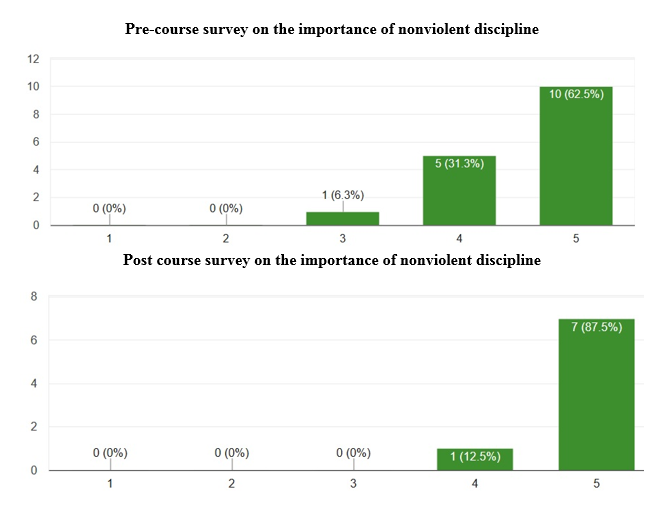
Final Evaluation Results
Included below are graphed responses to selected questions from the Final Course Evaluation.
1. The content, and structure of this course was well thought out and satisfactory.
The majority of students (75%) indicated that they were satisfied with the objectives, content, and structure of the course.
2. The course goals and lessons were clear and easy to understand
The majority of students (87.5%) reported that they were satisfied with the course goals and lessons.

3. The course instructor was knowledgeable about the course content
87.5% of students reported that the course instructor was knowledgeable about the course content
4. This course met or exceeded my expectations.
75% of students felt that the course either met or exceeded their expectations.
Course Testimonials
- It was a great opportunity for me to join in this course. I have gained more new ideas and it is a platform of sharing. I hope this course will be available for other participants.
- I really enjoyed learning this online course. I have learned lots of things about nonviolent conflict and gained some basic concepts. I will use these concepts in my work environment to solve problems. I will use this knowledge to give advice to others. This online course is well organized. The reading material, documentary videos, questions and answers were very helpful. The facilitator was excellent, always guiding us and explaining some points which I didn’t understand. I especially enjoyed that students had the chance to share their knowledge and experience with one another. I have learned a lot about nonviolent conflict and I will use this knowledge in my daily life.
- I was very satisfied with this online course because it taught me a lot about nonviolent conflict, both in Cambodia and around the world. I came to know about the strategy and tactics used in nonviolent civil resistance. This needs education, experience and knowledge especially the nonviolent discipline.
- It was my great opportunity to participate in this online course. This course equipped me with new knowledge in which I have never been interested before. It really opened my eyes wider to see what civil resistance really is. I began to realize how the society is ruled now. I will share what I have known from this course with as many people as I can. I would like to express my deep thanks to the instructor and ICNC for organizing and providing this online course. It really awakened my consciousness. I wish you a good luck. Thank you.
- This online course was quite important for the society and for the students. It provided me with basic knowledge on nonviolent conflict, which is a heated issues in Cambodia now.
- I was very satisfied with this online course. The content was very relevant. It allowed us to see the history of nonviolent conflict between the powerful and the powerless. I became informed of how people suffered in their lives as a result of regimes. This forum allowed me to get to know more people and learn from one another and exchange our ideas. I will use my knowledge gained from this course in my community. This online course was very important for the students and was a bank of knowledge on civil resistance.
Three Month Follow-up Survey
A follow-up survey was sent to course participants three months after the course ended. This survey is intended to measure the long-term impact of the course. See below for selected graphs and quotes from the three month follow-up survey. Responses were translated from Khmer to English.
- “How confident are you when you talk about nonviolent resistance with someone else?”
Out of 14 responses, 57% of course participants felt confident talking about nonviolent resistance, while 28% of course participants reported that they did not feel confident about having conversations on nonviolent resistance.
- “Have you used your knowledge gained from the online course in your daily life? Please explain.”
- “I studied topics related to nonviolent conflict as part of a semi-annual research project and provided a detailed presentation on the implications and impact of nonviolent protests.”
- “I used the knowledge gained from this course to educate myself and to look critically at different issues in society”
- I used the knowledge I gained from this course primarily for social and academic purposes.”
- “Do you think the online course is important in your daily life now? Please, explain.”
- “This online course has been important in my daily life because I understand the rights to freedom that the public has and learned that a way to achieve those rights is through nonviolent protest.”
- “I think the online course provided a vital message in my daily life, such as understanding the struggle against violence, understanding the practice of nonviolent resistance, and understanding a peaceful solution to societal problems.”
- “How has the online course inspired you so far? Please, explain.”
- This online course encouraged me to be more confident in taking nonviolent action and getting involved in my community .”
- “This course has encouraged me to share with my friends and relatives about the advantages of nonviolent conflict.”
